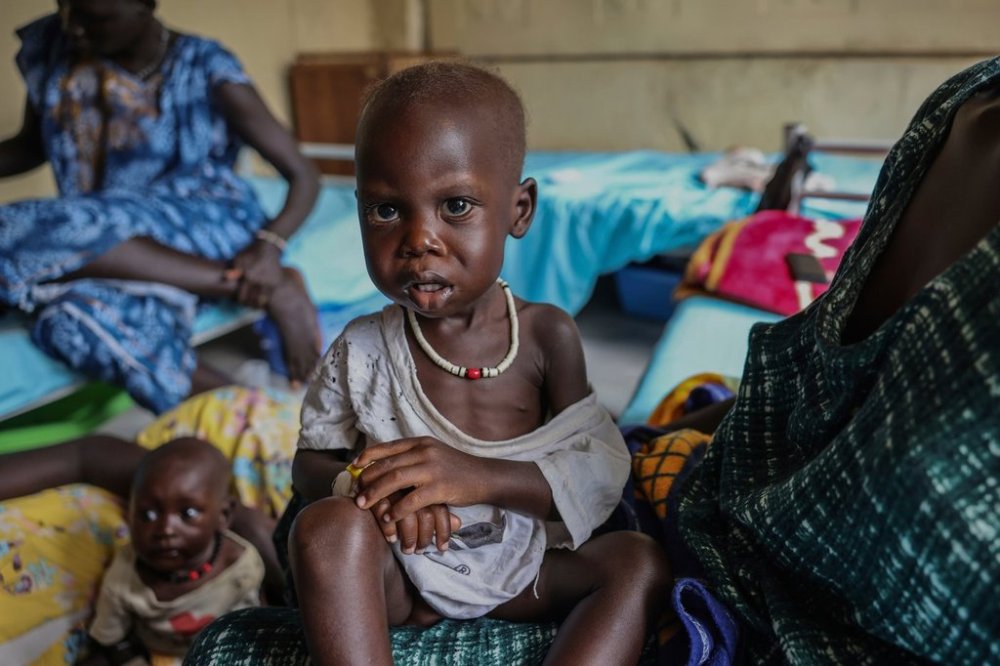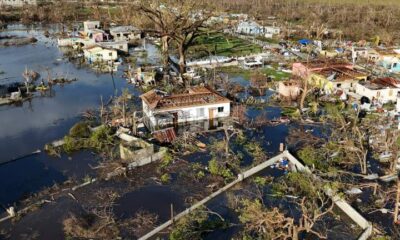World
South Sudan Faces Escalating Hunger Crisis Amid Corruption and Conflict

The hunger crisis in South Sudan has reached alarming levels, exacerbated by corruption, violence, and significant cuts in humanitarian aid. Children like Adut Duor, just 14 months old, are facing severe malnutrition. Instead of walking, Adut’s frail body shows signs of acute malnutrition, rendering him unable to thrive. His mother, Ayan, struggles with the heartbreaking reality of not being able to breastfeed him, a challenge shared by over 1.1 million pregnant and lactating women across the nation.
A recent report backed by the United Nations indicates that approximately 2.3 million children under five in South Sudan require treatment for acute malnutrition, with over 700,000 in severe condition. The report identifies renewed conflict in northern regions and reductions in humanitarian assistance as major contributors to this crisis. Since gaining independence in 2011, South Sudan has struggled with ongoing violence and poor governance, leading to dire humanitarian needs.
U.N. investigators have pointed to rampant corruption, accusing officials of embezzling billions of dollars from public funds. As a result, nearly 9 million of South Sudan’s 12 million citizens now depend on humanitarian aid. Recent funding cuts, coupled with ongoing violence and the impacts of climate change, are intensifying the hunger crisis.
At a hospital in Bor, located 200 kilometers from the capital, Juba, dozens of mothers are seen cradling their malnourished children. The number of malnutrition cases has more than doubled this year, a situation worsened by staff reductions within aid organizations. In May, funding cuts forced Save the Children to lay off 180 aid workers, including vital nutrition staff. This has led to severe shortages of ready-to-use therapeutic food, essential in treating malnourished children. According to Clement Papy Nkubizi, Country Director for Action Against Hunger, “Twenty-two percent of children admitted for malnutrition at Juba’s largest children’s hospital have died of hunger.”
The violence in northern states is further complicating the crisis by obstructing humanitarian access and displacing thousands of families from their agricultural lands. Although a peace deal signed in 2018 ended a five-year civil war, renewed conflicts between government forces and militia groups threaten to reignite widespread violence. In the Upper Nile State, where fighting has escalated, malnutrition rates are soaring. The U.N. reported that intensified combat along the White Nile River prevented essential supplies from reaching the area for over a month in May, leaving more than 60,000 children at risk of starvation.
In response to the dire needs, the South Sudanese government announced plans to utilize U.S. company Fogbow for airdrops in violence-affected regions. While the company claims to provide humanitarian support, U.N. workers have raised concerns about moving away from established aid systems.
The humanitarian situation is also worsened by natural disasters. Flooding, coupled with failed harvests, puts an additional 1.6 million people at risk of displacement. Shaun Hughes, the World Food Program’s regional emergency coordinator, emphasizes that malnutrition is not solely a result of food scarcity. “Cholera outbreaks, malaria, and poor sanitation compound the problem,” he states. With over 60% of the population lacking proper sanitation, contaminated water has become a significant health threat.
At Maban County Hospital, near the northern border with Sudan, Moussa Adil, an eight-month-old baby, cries for nourishment. His nutritionist, Butros Khalil, notes that there is no supplementary milk available, as the hospital has not received a significant supply since March. U.S. funding reductions have forced international aid groups to cut back on support, leaving healthcare workers without salaries for six months. Khalil describes the dire situation: “Now we are just eating leaves from the bush,” illustrating the severe economic pressures facing families in South Sudan.
The ongoing conflict in neighboring Sudan has disrupted trade routes and caused prices of basic goods to soar. With inflation exacerbating conditions, 92% of South Sudanese citizens live below the poverty line, a significant increase from last year, according to the African Development Bank. Families are forced to make desperate choices, pulling children out of school or selling livestock to survive.
Despite these challenges, the South Sudanese government allocates only 1.3% of its budget to health, well below the 15% target established by the World Health Organization. A recent UNICEF report highlights that 80% of the healthcare system relies on foreign aid, raising concerns about sustainability in the long term.
The U.N. Commission on Human Rights in South Sudan reported that billions of dollars have been lost to corruption, as officials divert funds meant for public welfare. The government has dismissed these allegations as “absurd.” Committee member Barney Afako emphasized that leaders are breaching international obligations to provide for the rights to food, health, and education.
Yasmin Sooka, Chairperson of the Commission, remarked that the siphoning off of funds by those in power could have been used to build schools, staff hospitals, and ensure adequate food supplies for the South Sudanese population. “Corruption is killing South Sudanese,” she stated, underscoring its role as a primary driver of the nation’s economic collapse, institutional decay, and ongoing humanitarian crisis.
As the international community expresses growing alarm over the worsening situation, the crisis continues to manifest in hospitals across South Sudan, where children like Moussa and Adut are caught in the tragic crossfire of corruption and conflict.
-

 Politics4 weeks ago
Politics4 weeks agoSecwepemc First Nation Seeks Aboriginal Title Over Kamloops Area
-

 World5 months ago
World5 months agoScientists Unearth Ancient Antarctic Ice to Unlock Climate Secrets
-

 Entertainment5 months ago
Entertainment5 months agoTrump and McCormick to Announce $70 Billion Energy Investments
-

 Science5 months ago
Science5 months agoFour Astronauts Return to Earth After International Space Station Mission
-

 Lifestyle5 months ago
Lifestyle5 months agoTransLink Launches Food Truck Program to Boost Revenue in Vancouver
-

 Technology3 months ago
Technology3 months agoApple Notes Enhances Functionality with Markdown Support in macOS 26
-

 Lifestyle3 months ago
Lifestyle3 months agoManitoba’s Burger Champion Shines Again Amid Dining Innovations
-

 Top Stories2 months ago
Top Stories2 months agoUrgent Update: Fatal Crash on Highway 99 Claims Life of Pitt Meadows Man
-

 Politics4 months ago
Politics4 months agoUkrainian Tennis Star Elina Svitolina Faces Death Threats Online
-

 Sports5 months ago
Sports5 months agoSearch Underway for Missing Hunter Amid Hokkaido Bear Emergency
-

 Politics5 months ago
Politics5 months agoCarney Engages First Nations Leaders at Development Law Summit
-

 Technology5 months ago
Technology5 months agoFrosthaven Launches Early Access on July 31, 2025





















